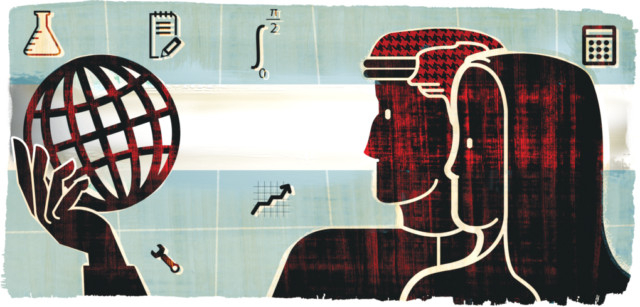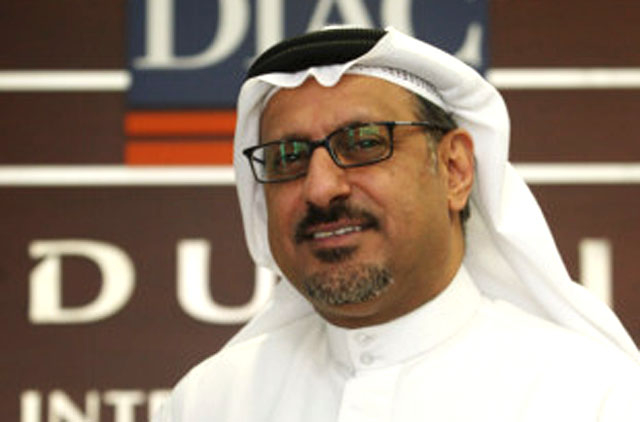
As Managing Director of the Education Cluster of TECOM Investments, a Dubai government holding, Dr Ayoub Kazim is in charge of the country’s leading education hotspots – Dubai International Academic City (DIAC) and Dubai Knowledge Village (DKV).
He is sensitive to the needs of the industries in UAE and has a pulse on the quality of education being imparted in the international branches on the DIAC campus. He is deeply committed to the vision to convert the UAE into a knowledge-based economy and as such is aware of the workforce skills gaps in the region.
It is important, he says, that students of the current generation not entirely focus on soft sciences and instead steer towards STEM (Science, Technology, Engineering and Mathematics) subjects. This, he believes, will help meet the growing demands of a rapidly growing, diversifying economy.
In a conversation with Education, he explains the reasons for his belief.
Why is a gap between academia and industry?
This situation exists due to a number of reasons. Students need more clarity on the choice of subjects from the early stages (K-12 education) and need constant guidance through the years of primary, secondary and tertiary education. The industries also need to intervene early and give the students the right picture of their requirements and what programmes students need to pursue.
According to the Knowledge and Human Development Authority’s annual report on the higher education landscape of 2012, more that 43,000 students were enrolled in tertiary education sector. Of these only 30 per cent were enrolled in knowledge based economy areas. More graduates in certain disciplines are directly needed by the country to take it ahead if have to transform the UAE into a knowledge-based economy.
What is the situation right now?
Students prefer to enroll in business management programmes at the graduation level, whereas, we seriously need to focus on STEM subjects.
According to the World Economic Forum’s annual report published this year on the world competitiveness, the UAE was placed 24 out of 144 countries in the category of being an innovation-driven economy. We were ranked 27 last year and have already moved three notches above since then. The UAE is the only country from this region to be categorised this high in the slot of an innovation-driven economy. We were ahead of countries like Italy, Austria, etc.
We have worked hard to attain this status and we have to achieve high standards of living and well diversified sectors in our economy. We need to sustain this momentum. For this, just R& D is not enough; we also need to achieve business sophistication. Our free economic zones have given people pockets of specialisation to ply sophisticated trades and businesses. We need to have more and more skilled people in our workforce to continue this march.
I would take the UK as a role model here. The population of UK is one per cent of the world, but when it comes to publication in scientific journals, their representation is around 10 per cent. It is the sixth highest in engineering and manufacturing fields. Next year, the UK will require 2.4 million workers in STEM related fields. If we continue at this pace, we will need to generate a sophisticated workforce with specific skill sets to address the needs of our industries.
How can we achieve the optimum workforce with definite skills sets?
For this, we need to entice our students on the verge of graduation to seek these disciplines such as renewable energy, oil and gas, construction and building materials, conventional energy, real estate, IT, communication and the media, healthcare, medicine, medical technology. We need the current and future crop of graduates to sustain the pace of growth in the economy.
What needs to be done on the part of schools and colleges to close the gap?
Schools bear a huge share of responsibility in channelising student interests towards STEM subjects. The curriculum department needs to work on educational reforms to promote critical thinking and introduce a strong rigour in STEM subjects. Qatar was the first country to introduce educational reforms that helped completely revamp its primary and secondary education. But to prepare the students for challenges ahead we need to update the skill sets of the faculty members first. You cannot expect a faculty member who graduated 20 years ago to teach students about up to date technology. Unless they are updated, the students cannot be taught. So the first thing is to develop the skills of teachers. This is an area of challenge that educators face.
What role can the industry play in this? Would internships from undergraduate Year One help? What else can be done to prepare students for the jobs they eventually take up?
The industry has to be very active at the secondary education level. They should organize programmes to enlighten students about the nature and scope or STEM subjects. Organisations such as DU and Etisalat can sponsor programmes on IT and telecommunications and Emaar on the construction industry and property development, Emirates Airlines can sponsor programmes on aeronautics, engineering and similarly leading banks can sponsor programmes on banking, finance, accounting – all meant for students of Grade 11 and 12, and for students in the final year of graduation. Industries can have special sessions for teachers and prepare them on workforce planning familiarising them with the requirements of this region and also to update them on technological advancements.
Could you share the main outcome of the Deloitte study that DIAC had assigned on this work force skills gap? What were the recommendations if any?
DIAC sponsored the Regional Workforce study 2013 and it was conducted by Deloitte. It focussed on the skills gap that graduates had as they were falling short of industry expectations. It covered Asia, GCC countries, Middle East and the Levant region – about 2400 students in 17 countries plus 235 companies covering 11 sectors plus 15 executive search firms.
We looked at the industry trends and focused on about 64 skill sets that are required in 11 sectors such as energy, construction, hospitality, etc, and looked at the demands of the industries and the challenge of recruiting fresh graduates from colleges. Such studies give us a sharper perspective on issues that beset the region. The detailed result of the report will be shared with the media in the coming months. We want to facilitate the dialogue between academic providers and the industries.
What is the time window the country has in which to close this gap?
We have long-term, short-term and medium-term plans to implement this vision. The long plan involves working towards bridging the gap between industry and academia to realize HH Sheikh Mohammad bin Rashid Al Maktoum’s vision of creating a knowledge based economy in the next ten years.
In the short term, we at least need to see that the academic providers are working closely with the industries to overcome the challenges. In the next three years we intend to look at what programmes are required by industries and work to help them collaborate with the academic providers to fulfill this gap.
In the mid-term plan which stretches from 3-10 years, we will make sure we implement the strategies we plan and make sure that more and more students opt for STEM subjects.
What role can DIAC and DKV play in helping universities collapse this gap?
Throughout these phases we – the DIAC and DKV -play a role as we are the facilitators too. We bring together the various stakeholders and set a strategy.
Is there a need for creation of an intermediate organisation or body that takes freshers from college, trains them according to industry requirements and places them according to the skill sets they acquire?
This is an area that we would like to work in setting up vocational studies organisations. Not all students who complete high school need to go into higher education.
Currently, there are at least 1 million school-going students. Of these, nearly 850,000 in the K-12 phase, 130,000 in higher education. Only 20,000 go to vocational education schools which is not even 2 percent of the total student population.
We need to change mindset of parents who think it is important for their child to get a university degree. A work-oriented degree with a vocational training institute could provide good jobs and careers to young people and might be the right model to emulate.
Currently we have the National Institute of Vocational Education (NIVE) in Dubai, the Abu Dhabi Vocational training and Educational Institute (ADVETI) Institute of Applied Technology, both in Abu Dhabi. We need more such institutes that can be the link between academic education and industries. In the DIAC cluster, we have organisations like the SAE Institute, the largest worldwide college for audio production, and if the trend is encouraged, more students will begin enrolling.
We can emulate the example of Temple University In Philadelphia US, that offers a bachelor’s degree in Vocational Education and is a very successful example of how vocational training can be blended with a university degree. There are great programs being introduced in our international branch campuses of Manipal which offers a Ph.D in biotechnology, a very niche programme.
Amity offers courses in nuclear technology, forensic science, aerospace engineering, BITS, Pilani offers comprehensive engineering programmes. The Heriot Watt University campus offers a degree in renewable energy and automative engineering. There are plenty of university branches in the clusters offering novel and challenging degrees in STEM subjects.
So, the future trends are being set.













